| Listing 1 - 10 of 14 | << page >> |
Sort by
|
Book
ISBN: 1282104799 9786612104794 9027290032 9789027290038 9781282104792 9027252114 9789027252111 Year: 2009 Publisher: Amsterdam Philadelphia John Benjamins Pub. Co.
Abstract | Keywords | Export | Availability | Bookmark
 Loading...
Loading...Choose an application
- Reference Manager
- EndNote
- RefWorks (Direct export to RefWorks)
Panpsychism is the view that all things, living and nonliving, possess some mind like quality. It stands in sharp contrast to the traditional notion of mind as the property of humans and (perhaps) a few select 'higher animals'. Though surprising at first glance, panpsychism has a long and noble history in both Western and Eastern thought. Overlooked by analytical, materialist philosophy for most of the 20th century, it is now experiencing a renaissance of sorts in several areas of inquiry. A number of recent books - including Skrbina's Panpsychism in the West (2005) and Strawson et al's Consciousness and its Place in Nature (2006) - have established panpsychism as respectable and viable. Mind That Abides builds on these works. It takes panpsychism to be a plausible theory of mind and then moves forward to work out the philosophical, psychological and ethical implications. With 17 contributors from a variety of fields, this book promises to mark a wholesale change in our philosophical outlook. (Series A).
Panpsychism. --- Philosophy. --- Mental philosophy --- Humanities --- Animism --- Consciousness --- Philosophy --- Hylozoism --- Consciousness. --- Mind-Body Relations (Metaphysics). --- Psychophysiology.
Book
ISBN: 0190293802 1281998435 9786611998431 0199724091 0197742408 6611998438 9780199724093 9780195301021 0195301021 9780190293802 9781281998439 Year: 2009 Publisher: Oxford New York Oxford University Press
Abstract | Keywords | Export | Availability | Bookmark
 Loading...
Loading...Choose an application
- Reference Manager
- EndNote
- RefWorks (Direct export to RefWorks)
This work connects Western therapeutic techniques with Eastern philosophy and practices while also providing a comprehensive and pragmatic agenda for social work and mental health professionals.
Social service. --- Mind and body. --- Mind-Body Relations (Metaphysics) --- Social Work.
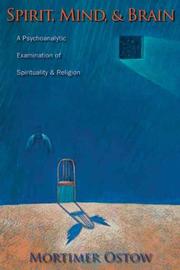
ISBN: 0231139004 9780231139007 0231511205 9780231511209 Year: 2006 Publisher: New York, NY
Abstract | Keywords | Export | Availability | Bookmark
 Loading...
Loading...Choose an application
- Reference Manager
- EndNote
- RefWorks (Direct export to RefWorks)
Preeminent psychoanalyst Mortimer Ostow believes that early childhood emotional attachments form the cognitive underpinnings of spiritual experience and religious motivation. His hypothesis, which is verifiable, relies on psychological and neurobiological evidence but is respectful of the human need for spiritual value. Ostow begins by classifying the three parts of the spiritual experience: awe, Spirituality proper, and mysticism. After he pinpoints the psychological origins of these feelings in infancy, he discusses the foundations of religious sentiment and practice and the brain processes associated with spiritual experience. He then focuses on spirituality's relationship to mood regulation, and the role of negative spirituality in fostering religious fundamentalism and demonic possession.Ostow concludes with an analysis of an essay by the psychoanalyst Donald M. Marcus, who recounts his own spiritual experience during a Native American-style "vision quest" in the woods. Marcus's account demonstrates the constructive potential of spirituality and the way in which spirituality retrieves and recapitulates feelings of attachment to the mother.Persuasively and brilliantly argued, Spirit, Mind, and Brain brings the disciplines of religion, behavorial neuroscience, and philosophy to bear on a groundbreaking new method for understanding religious ritual and belief.
Psychoanalysis and religion. --- Psychology and religion. --- Psychology, Religious. --- Psychoanalytic Interpretation. --- Spirituality. --- Mind-Body Relations (Metaphysics) --- Psychoanalytic Theory. --- Religion and Medicine. --- Psychoanalysis and religion --- Psychology and religion --- Psychology, Religious --- 159.9:2 --- Psychology of religion --- Religion --- Religions --- Religious psychology --- Religion and psychology --- Religion and psychoanalysis --- Godsdienstpsychologie --- Psychological aspects --- Psychology --- 159.9:2 Godsdienstpsychologie --- Mind-Body Relations (Metaphysics). --- spirituality --- religiosity --- mysticism --- psychoanalysis --- psychological health
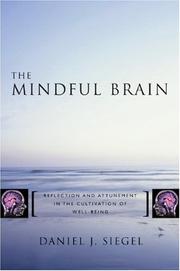
ISBN: 9780393704709 039370470X Year: 2007 Publisher: New York: Norton,
Abstract | Keywords | Export | Availability | Bookmark
 Loading...
Loading...Choose an application
- Reference Manager
- EndNote
- RefWorks (Direct export to RefWorks)
Psychophysiology. --- Brain --- Mind-Body Relations (Metaphysics). --- Mind-Body and Relaxation Techniques. --- Awareness. --- Psychophysiologie --- Prise de conscience --- physiology. --- Psychophysiology --- Awareness --- Mind-Body Relations, Metaphysical --- physiology --- Mind-Body Relations, Metaphysical. --- Brain - physiology
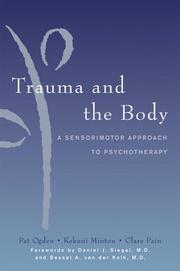
ISBN: 0393704572 9780393704570 Year: 2006 Publisher: New York (N.Y.) : Norton,
Abstract | Keywords | Export | Availability | Bookmark
 Loading...
Loading...Choose an application
- Reference Manager
- EndNote
- RefWorks (Direct export to RefWorks)
Body language. --- Body, Human --- Mind and body therapies. --- Mind and body. --- Mind-Body Relations (Metaphysics). --- Psychic trauma --- Psychotherapy. --- Self. --- Sensorimotor integration. --- Stress Disorders, Post-Traumatic --- Psychological aspects. --- Treatment. --- therapy. --- PXL-Healthcare 2017 --- klinische psychologie --- neurobiologie --- psychotherapie --- trauma
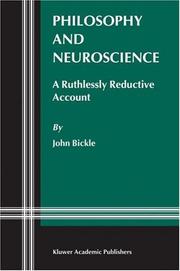
ISBN: 9401002371 1402013027 1402073941 Year: 2003 Publisher: Dordrecht Kluwer Academic
Abstract | Keywords | Export | Availability | Bookmark
 Loading...
Loading...Choose an application
- Reference Manager
- EndNote
- RefWorks (Direct export to RefWorks)
Philosophy and Neuroscience: A Ruthlessly Reductive Account is the first book-length treatment of philosophical issues and implications in current cellular and molecular neuroscience. John Bickle articulates a philosophical justification for investigating "lower level" neuroscientific research and describes a set of experimental details that have recently yielded the reduction of memory consolidation to the molecular mechanisms of long-term potentiation (LTP). These empirical details suggest answers to recent philosophical disputes over the nature and possibility of psycho-neural scientific reduction, including the multiple realization challenge, mental causation, and relations across explanatory levels. Bickle concludes by examining recent work in cellular neuroscience pertaining to features of conscious experience, including the cellular basis of working memory, the effects of explicit selective attention on single-cell activity in visual cortex, and sensory experiences induced by cortical microstimulation. This final chapter poses a challenge both to "mysterians," who insist that empirical science cannot address particular features of consciousness, and to cognitivists, who insist that addressing consciousness scientifically will require experimental and theoretical resources that go beyond those used in neuroscience's cellular and molecular core. Bickle develops all scientific and philosophical concepts in detail, making this book accessible to specialists, graduate students, and advanced undergraduates in either philosophy or the empirical brain and cognitive sciences. Philosophers of science, mind, neuroscience, and psychology, neuroscientists working at a variety of levels, and cognitive scientists-or anyone interested in interactions between contemporary philosophy and science and the nature of reduction-in-practice that informs current mainstream neuroscience-will find discussions pertinent to their concerns.
Neurosciences --- Philosophy. --- Philosophical anthropology --- Physiology of nerves and sense organs --- Mind-Body Relations (Metaphysics). --- Neuroscience. --- Psychological Theory. --- Psychophysiology. --- Neuropsychology. --- Philosophy of mind. --- Philosophy and science. --- Philosophy of Mind. --- Philosophy of Science. --- Science and philosophy --- Science --- Mind, Philosophy of --- Mind, Theory of --- Theory of mind --- Philosophy --- Cognitive science --- Metaphysics --- Neurophysiology --- Psychophysiology
Book
ISBN: 0745636438 0745636446 9780745636436 9780745636443 Year: 2009 Publisher: Cambridge Polity press
Abstract | Keywords | Export | Availability | Bookmark
 Loading...
Loading...Choose an application
- Reference Manager
- EndNote
- RefWorks (Direct export to RefWorks)
Holistic Health. --- Medicine and psychology. --- Mind and body. --- Mind-Body Relations (Metaphysics). --- Medicine and psychology --- Mind and body --- #SBIB:316.334.3M20 --- Body and mind --- Body and soul (Philosophy) --- Human body --- Mind --- Mind-body connection --- Mind-body relations --- Mind-cure --- Somatopsychics --- Brain --- Dualism --- Philosophical anthropology --- Holistic medicine --- Mental healing --- Parousia (Philosophy) --- Phrenology --- Psychophysiology --- Self --- Behavioral medicine --- Psychology and medicine --- Psychology, Applied --- Sociale epidemiologie en etiologie: sociale aspecten van ziekte en gezondheid --- Psychological aspects
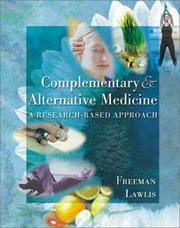
ISBN: 0323006973 Year: 2001 Publisher: Saint Louis Mosby
Abstract | Keywords | Export | Availability | Bookmark
 Loading...
Loading...Choose an application
- Reference Manager
- EndNote
- RefWorks (Direct export to RefWorks)
Complementary Therapies. --- Exercise. --- Mental Healing. --- Mind-Body Relations, Metaphysical. --- Plants, Medicinal. --- Healing Plants --- Medicinal Plants --- Pharmaceutical Plants --- Herbs, Medicinal --- Medicinal Herbs --- Healing Plant --- Herb, Medicinal --- Medicinal Herb --- Medicinal Plant --- Pharmaceutical Plant --- Plant, Healing --- Plant, Medicinal --- Plant, Pharmaceutical --- Plants, Healing --- Plants, Pharmaceutical --- Pharmaceutical Preparations --- Phytotherapy --- Medicine, Traditional --- Pharmacognosy --- Ethnopharmacology --- Herbal Medicine --- Healing, Mental --- Religion --- Aerobic Exercise --- Exercise, Aerobic --- Exercise, Isometric --- Exercise, Physical --- Isometric Exercise --- Aerobic Exercises --- Exercises --- Exercises, Aerobic --- Exercises, Isometric --- Exercises, Physical --- Isometric Exercises --- Physical Exercise --- Physical Exercises --- Exercise Therapy --- Physical Exertion --- Physical Fitness --- Sports --- Exercise Movement Techniques --- Alternative Therapies --- Therapy, Alternative --- Therapy, Complementary --- Alternative Medicine --- Complementary Medicine --- Medicine, Alternative --- Medicine, Complementary --- Therapies, Alternative --- Therapies, Complementary --- Alternative medicine --- Acute Exercise --- Exercise Training --- Physical Activity --- Activities, Physical --- Activity, Physical --- Acute Exercises --- Exercise Trainings --- Exercise, Acute --- Exercises, Acute --- Physical Activities --- Training, Exercise --- Trainings, Exercise --- Alternative medicine. --- Body-Mind Relations --- Soul-Body Relations --- Mind-Body Relations (Metaphysics) --- Mind-Body Relations (Non-Physiology) --- Body Mind Relations --- Body-Mind Relation --- Metaphysical Mind-Body Relation --- Metaphysical Mind-Body Relations --- Mind Body Relations (Metaphysics) --- Mind Body Relations (Non Physiology) --- Mind Body Relations, Metaphysical --- Mind-Body Relation (Metaphysics) --- Mind-Body Relation (Non-Physiology) --- Mind-Body Relation, Metaphysical --- Relation, Body-Mind --- Relation, Metaphysical Mind-Body --- Relation, Mind-Body (Metaphysics) --- Relation, Mind-Body (Non-Physiology) --- Relation, Soul-Body --- Relations, Body-Mind --- Relations, Metaphysical Mind-Body --- Relations, Mind-Body (Metaphysics) --- Relations, Mind-Body (Non-Physiology) --- Relations, Soul-Body --- Soul Body Relations --- Soul-Body Relation --- Complementary Therapies --- Exercise --- Mental Healing --- Mind-Body Relations, Metaphysical --- Plants, Medicinal
Periodical
Abstract | Keywords | Export | Availability | Bookmark
 Loading...
Loading...Choose an application
- Reference Manager
- EndNote
- RefWorks (Direct export to RefWorks)
Medicine, Psychosomatic --- Mind and body --- Mind-Body Relations (Metaphysics) --- Psychophysiology. --- Psychosomatic Medicine. --- Medicine, Psychosomatic. --- Mind and body. --- Mind-Body Relationship (Physiology) --- Physiologic Psychology --- Physiological Psychology --- Psychology, Physiologic --- Mind-Body Relations (Physiology) --- Psychology, Physiological --- Mind Body Relations (Physiology) --- Mind Body Relationship (Physiology) --- Mind-Body Relation (Physiology) --- Mind-Body Relationships (Physiology) --- Physiologic Psychologies --- Psychologies, Physiologic --- Relation, Mind-Body (Physiology) --- Relations, Mind-Body (Physiology) --- Relationship, Mind-Body (Physiology) --- Relationships, Mind-Body (Physiology) --- Body-Mind Relations --- Soul-Body Relations --- Mind-Body Relations (Non-Physiology) --- Body Mind Relations --- Body-Mind Relation --- Metaphysical Mind-Body Relation --- Metaphysical Mind-Body Relations --- Mind Body Relations (Metaphysics) --- Mind Body Relations (Non Physiology) --- Mind Body Relations, Metaphysical --- Mind-Body Relation (Metaphysics) --- Mind-Body Relation (Non-Physiology) --- Mind-Body Relation, Metaphysical --- Relation, Body-Mind --- Relation, Metaphysical Mind-Body --- Relation, Mind-Body (Metaphysics) --- Relation, Mind-Body (Non-Physiology) --- Relation, Soul-Body --- Relations, Body-Mind --- Relations, Metaphysical Mind-Body --- Relations, Mind-Body (Metaphysics) --- Relations, Mind-Body (Non-Physiology) --- Relations, Soul-Body --- Soul Body Relations --- Soul-Body Relation --- Body and mind --- Body and soul (Philosophy) --- Human body --- Mind --- Mind-body connection --- Mind-body relations --- Mind-cure --- Somatopsychics --- Psychosomatic medicine --- Psychological aspects --- Mind-Body Relations, Metaphysical. --- Psychophysiology --- Psychosomatic Medicine --- Mind-Body Relations, Metaphysical --- Brain --- Dualism --- Philosophical anthropology --- Holistic medicine --- Mental healing --- Parousia (Philosophy) --- Phrenology --- Self --- Medicine and psychology --- Neuroses --- Psychology, Pathological
Book
ISBN: 026228345X 9780262283458 1417561785 9781417561780 Year: 2004 Publisher: Cambridge, Mass. : MIT Press,
Abstract | Keywords | Export | Availability | Bookmark
 Loading...
Loading...Choose an application
- Reference Manager
- EndNote
- RefWorks (Direct export to RefWorks)
"How are the mind and body harnessed together? In The Mind Incarnate Lawrence Shapiro addresses this question by testing two widely accepted hypothesis, the multiple realizability thesis and the separability thesis. He argues that there is significant - though far from decisive - evidence against them." "Collecting evidence from a variety of sources (e.g., neuroscience, evolutionary theory, and embodied cognition) he concludes that the multiple realizability thesis, accepted by most philosophers as a virtual truism, is much less obvious than commonly assumed, and that there is even stronger reason to give up the separability thesis. In contrast to views of mind that tempt us to see the mind as simply being resident in a brain or body, Shapiro's view is a far more encompassing integration of mind, brain, and body than philosophers have supposed."--Jacket.
Mind and body. --- Body Image. --- Mind-Body Relations, Metaphysical. --- Mind and body --- Body Image --- Mind-Body Relations, Metaphysical --- Mental Processes --- Perception --- Psychological Phenomena and Processes --- Psychiatry and Psychology --- Psychology --- Social Sciences --- Psychologic Processes --- Psychologic Processes and Principles --- Psychological Processes --- Phenomena, Psychological --- Processes, Psychologic --- Processes, Psychological --- Psychological Phenomenas --- Psychological Processe --- Sensory Processing --- Processing, Sensory --- Sensation --- Human Information Processing --- Information Processing, Human --- Body-Mind Relations --- Soul-Body Relations --- Mind-Body Relations (Metaphysics) --- Mind-Body Relations (Non-Physiology) --- Body Mind Relations --- Body-Mind Relation --- Metaphysical Mind-Body Relation --- Metaphysical Mind-Body Relations --- Mind Body Relations (Metaphysics) --- Mind Body Relations (Non Physiology) --- Mind Body Relations, Metaphysical --- Mind-Body Relation (Metaphysics) --- Mind-Body Relation (Non-Physiology) --- Mind-Body Relation, Metaphysical --- Relation, Body-Mind --- Relation, Metaphysical Mind-Body --- Relation, Mind-Body (Metaphysics) --- Relation, Mind-Body (Non-Physiology) --- Relation, Soul-Body --- Relations, Body-Mind --- Relations, Metaphysical Mind-Body --- Relations, Mind-Body (Metaphysics) --- Relations, Mind-Body (Non-Physiology) --- Relations, Soul-Body --- Soul Body Relations --- Soul-Body Relation --- Body Representation --- Body Schema --- Body Identity --- Body Images --- Body Representations --- Body Schemas --- Identity, Body --- Image, Body --- Representation, Body --- Schema, Body --- Physical Appearance, Body --- Self Concept --- Body and mind --- Body and soul (Philosophy) --- Human body --- Mind --- Mind-body connection --- Mind-body relations --- Mind-cure --- Somatopsychics --- Brain --- Dualism --- Philosophical anthropology --- Holistic medicine --- Mental healing --- Parousia (Philosophy) --- Phrenology --- Psychophysiology --- Self --- Psychological aspects --- Psychological Phenomena --- Psychiatry --- Mental Processes. --- Perception. --- Psychological Phenomena. --- Psychiatry.
| Listing 1 - 10 of 14 | << page >> |
Sort by
|

 Search
Search Feedback
Feedback About UniCat
About UniCat  Help
Help News
News